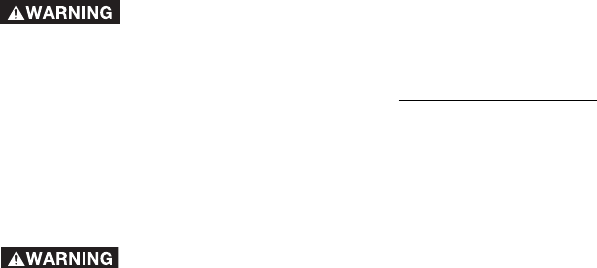
5
l When the blade is pinched or bound tightly by the kerf closing down,
the blade stalls and the motor reaction drives the unit rapidly back
toward the operator.
l If the blade becomes twisted or misaligned in the cut, the teeth at the
back edge of the blade can dig into the top surface of the wood causing
the blade to climb out of the kerf and jump back toward the operator.
l Kickback is the result of tool misuse and/or incorrect operating procedures
or conditions and can be avoided by taking proper precautions as given
below:
14. Maintain a firm grip on the saw and position your body and arm in a
way that allows you to resist KICKBACK forces. KICKBACK forces can be
controlled by the operator, if proper precautions are taken.
15. When blade is binding, or when interrupting a cut for any reason,
release the trigger and hold the saw motionless in the material until the
blade comes to a complete stop. Never attempt to remove the saw from the
work or pull the saw backward while the blade is in motion or KICKBACK
may occur. Investigate and take corrective actions to eliminate the cause of
blade binding.
16. When restarting a saw in the workpiece, center the saw blade in the
kerf and check that teeth are not engaged into the material. If saw blade is
binding, it may walk up or KICKBACK from the workpiece as the saw is
restarted.
17. Support large panels to minimize the risk of blade pinching and
KICKBACK. Large panels tend to sag under their own weight. Supports must be
placed under the panel on both sides, near the line of cut and near the edge of
the panel.
18. Do not use dull or damaged blade. Unsharpened or improperly set blades
produce narrow kerf causing excessive friction, blade binding, and KICKBACK.
19. Blade depth and bevel adjusting locking levers must be tight and
secure before making cut. If blade adjustment shifts while cutting, it will cause
binding and KICKBACK.
20. Use extra caution when making a “Pocket Cut” into existing walls or
other blind areas. The protruding blade may cut objects that can cause
KICKBACK.
21. Some wood contains preservatives which can be toxic. Take extra care to
prevent inhalation and skin contact when working with these materials. Request,
and follow, all safety information available from your material supplier.
Technical Service Manager
Porter-Cable Corporation
4825 Highway 45 North
Jackson, TN 38305
There are certain applications for which this tool was
designed. Porter-Cable strongly recommends that this tool NOT be modified
and/or used for any application other than for which it was designed. If you have
any questions relative to its application, DO NOT use the tool until you have
written Porter-Cable and we have advised you.
Improper operation or maintenance of this product could result
in serious injury and property damage. Read and understand all warnings and
operating instructions before using this tool. When using power tools, basic
safety precautions should always be followed to reduce the risk of personal
injury. For additional information visit our website www.porter-cable.com
.
Additional Information regarding the safe and proper operation of power tools
(i.e. a safety video) is available from the Power Tool Institute, 1300 Sumner
Avenue, Cleveland, OH 44115-2851 (www.powertoolinstitute.com). Additional
Information is also available from the National Safety Council, 1121 Spring Lake
Drive, Itasca, IL 60143-3201, the American National Standards Institute ANSI
01.1Safety Requirements for Woodworking Machines, and the U.S. Department
of Labor regulations.

















